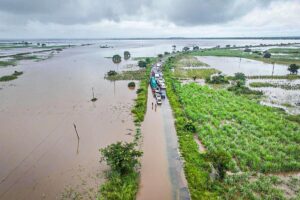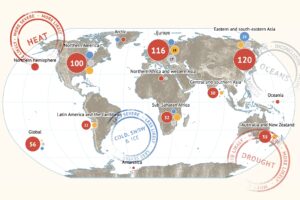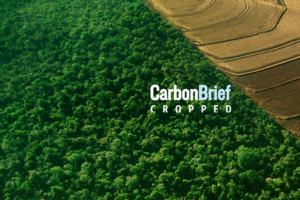We handpick and explain the most important stories at the intersection of climate, land, food and nature over the past fortnight.
This is an online version of Carbon Brief’s fortnightly Cropped email newsletter. Subscribe for free here.
Key developments
Trump’s logging orders
IF A TREE FALLS: US president Donald Trump last week signed a pair of executive orders “to increase lumber production across national forests and other public lands”, Axios reported. The outlet explained that the first order “calls for considering new categorical exclusions” under the existing law that requires environmental reviews, while the second “promotes domestic timber production to replace imports”. The latter order dealt “a devastating blow” to forests on public lands, said Inside Climate News. The outlet added that “increasing timber production would likely target the larger, older trees that are the most critical to protect as climate change accelerates”.
QUESTIONABLE IMPACT: The Trump administration claims that increasing timber production will be “the next frontier in job creation and wildfire prevention”, USA Today reported. Timber groups and lawmakers representing rural districts were in agreement, the outlet said. It added: “But conservation groups and forestry experts say cutting down more trees doesn’t inherently reduce wildfire risk and can actually increase it.” The orders are “expected to face legal pushback”, USA Today said.
NOT SO CLEAR CUT: Despite the claims of a viral Instagram post, the executive orders do not compel the clearing of 280m acres (1.1m square kilometres) of national forest, noted a Yahoo News factcheck. The outlet added that the total area of land affected by the orders is actually 251m acres (1m km2) and that “even in the most extreme scenario, the US logging industry wouldn’t have the sawmills or workers required” to clear-cut that much forest in the next four years. It said: “But whatever the scale, environmentalists warn that expanding logging while reducing oversight will damage fragile ecosystems, threaten old-growth forests, increase pollution and even worsen wildfires.”
Tit-for-tat tariffs
FOOD FIGHT: On Monday, China began imposing tariffs on US farm products, in what the New York Times called “the latest escalation of a trade fight between the world’s two largest economies”. China’s tariffs include a 15% levy on US-raised chicken, wheat and corn, along with a 10% levy on other food products, the newspaper reported. Describing the food tariffs as “a high impact yet low-cost weapon” in the US-China trade war, Bloomberg noted that “the Asian giant remains a key export market for largely Republican states in the midwest farm belt”. Alongside the new levy, it added that China also halted all American timber purchases and soybean imports from three US firms. The Washington Post mapped where tariffs could “hit” US farmers and jobs “the hardest”.
AG INDEPENDENCE: The latest move is part of China’s “broader strategy” to strengthen its food security since Trump’s first term, reported Business Standard, tracing a timeline of the country’s initiatives “to reduce its reliance on US imports”. US farmers and experts who spoke to Time magazine said they “know from experience” that Trump’s “incipient trade war will make things tougher” for them. The outlet added that “around 80% of the money the US government took in from tariffs on Chinese imports [during Trump’s first term] went back to paying farmers” affected by retaliatory tariffs. The US-China food trade fight will give Brazilian exporters “an opportunity to take an even bigger share of the Chinese market”, Reuters reported, adding that it “could also fuel already-high food inflation in Brazil”.
UH OH, CANADA: At the same time, China “open[ed] a new front in a trade war”, announcing tariffs on over $2.6bn worth of Canadian agricultural and food products on Saturday, according to Reuters. The measures include a 100% tariff on Canadian rapeseed oil and pea imports, the newswire explained. It said that China’s tariffs on Canada are being seen as a “warning shot” and “retaliati[on] against levies Ottawa introduced in October” on China-made electric vehicles and aluminium products. Canada’s 40,000 rapeseed farmers are now “caught in the middle of political tensions far outside [their] control” amid two trade fights, the Globe and Mail reported, with China’s moves combining with the “threat of 25% tariffs on $7.7bn of exports to the US, their largest market”.
Spotlight
Mining drives ‘destruction’ in Peru’s peatlands
This week, Carbon Brief covers a new study that found that small-scale, artisanal gold mining in the Peruvian Amazon is a small but growing cause of “destruction” for the region’s carbon-rich peatlands.
Peatland loss due to small-scale gold mining in the Peruvian Amazon has released up to 0.7m tonnes of carbon – some 2.6m tonnes of carbon dioxide (CO2) – over the past 35 years, according to new research.
The study, published in Environmental Research Letters, used satellite imagery to determine where “artisanal” mining had driven deforestation in the Madre de Dios river plain.
The researchers found that while only 5% of the mined area overlapped with known peatlands, 55% of this peatland loss occurred within just the past two years.
They warned that mining in Peru’s peatlands is “happening at a scale sufficiently large to threaten the future existence of peatland on the Madre de Dios landscape”.
Mining-driven deforestation
Peatlands are carbon-rich, water-logged ecosystems that form slowly over time as plant matter dies and partially decomposes.
Although they make up only 3% of the Earth’s land surface, peatlands are estimated to contain 600bn tonnes of carbon – more than is stored in all of the world’s forests combined.
Despite their importance as carbon stores, peatlands are underprotected compared to other “high-value” ecosystems, such as tropical forests. A recent study found that just 17% of peatlands are protected globally.
Artisanal gold mining – referring to mining done informally and with basic tools – is one of the main drivers of deforestation in the Peruvian Amazon in recent decades. It is highly concentrated around the Madre de Dios river, which cuts through the south-eastern part of the country.
To understand the impact of this type of mining, the researchers used 35 years of data from NASA’s Landsat satellite to monitor changes in the region around the Madre de Dios river known as its alluvial plain. They then used an algorithm to differentiate deforestation that was caused by artisanal mining from deforestation due to other factors.
The researchers identified 11,356 hectares of mining in the alluvial plain, two-thirds of which was concentrated in a 50-kilometre stretch of river.
Peatland loss
The researchers then overlaid the identified mining sites with maps of the Madre de Dios peatland complex.
They identified more than 550 hectares of peatland that had been lost to artisanal mining between 1985 and 2023. They estimated that this “destruction” released between 0.2m and 0.7m tonnes of carbon into the atmosphere, resulting in emissions of up to 2.6MtCO2.
Moreover, mining in peatland areas has increased twice as quickly as the average rate of increase across the plain as a whole over the past five years. More than 10,000 hectares of peatland, containing between 3.5 and 14.5m tonnes of carbon, are at “imminent risk”, the authors warn.
Dr John Householder, a researcher at Germany’s Karlsruhe Institute of Technology and an author of the study, said in a statement:
“Even within a human generation, it is quite possible that large peat deposits can disappear from the landscape, before science has had a chance to describe them. For those peat deposits that are already known, these research findings are a wakeup call to protect them.”
News and views
IWATE ABLAZE: Japan was faced with its “worst wildfire in half a century” in early March, Agence France-Presse reported. The fire, which broke out in the Iwate prefecture on the country’s Pacific coast, “engulfed around 2,600 hectares” and “left one dead”, the newswire said. The Japan Times noted that “unusually dry weather, strong winds and the city’s terrain have made the situation worse than usual”. Dr Akira Kato, a forestry professor at Japan’s Chiba University, told the outlet: “There is a big misconception that fires don’t occur in humid climates, but this is actually not true, and forest fires can occur anywhere in the world.”
EXTINCTION LITIGATION: Australia’s environment minister, Tanya Pilbersek, is being sued by conservation non-profit the Wilderness Society for failing in “her promise to halt Australia’s ongoing extinction crisis”, the Sydney Morning Herald reported. The case does not mention Pilbersek by name but alleges “successive environment ministers are to blame” for failing to “implement plans to save endangered animals”, the newspaper said. Pilbersek, it added, has responded by saying “she had made double the number of [nature] recovery plans than her predecessor”. Separately, ABC News reported that Tasmania’s salmon industry is being hit by mass die-offs due to bacterial disease, with “chunks” of thousands of dead salmon washing up ashore.
ARMY OF ME: After the “worst drought in decades”, Context News reported that Zimbabwe’s maize farmers are now battling an infestation of the fall armyworm. The pests are “[n]ative to the Americas” but have “spread across almost all of sub-Saharan Africa” in just two years, according to the UN Food and Agriculture Organization (FAO). The outlet quotes Patrice Talla of the FAO saying: “Climate change has contributed to outbreaks of migratory pests beyond their regions of origin, notably the fall armyworm.” According to the story, the armyworm “reduces maize yields by up to 73% and inflicts annual economic losses valued at $9.4bn in Africa alone”, its “crop-munching” impacts also affecting Malawi, Zambia, Togo, Benin and Swaziland.
SUDANESE BREW: Excelsea coffee – discovered in South Sudan nearly a century ago – is drawing international interest “amid a global coffee crisis caused mainly by climate change”, the Associated Press reported. The coffee variety currently accounts for “less than 1% of the global market” but production trials by agroforestry company Equatoria Teak indicate that it can “thrive in extreme conditions, such as drought and heat, where other coffees cannot”, according to the newswire. While the beans “represent a chance at a better future” for the country, farmer Elia Box – who lost half his coffee crop to fire in early February – told AP that long-term crops, such as coffee, need stability: “Coffee needs peace.”
ESTATE SALE: A “mystery donor” made a record land purchase in the Scottish Highlands on behalf of the Scottish Wildlife Trust – “the largest donation in the trust’s 60-year history”, according to the Times. It quoted the charity saying that by securing the 7,618-hectare Inverbroom Estate, it could “significantly enhance its efforts to protect and restore wildlife at scale across Scotland”. Furthermore, the newspaper noted that “the trust has made a commitment to the donor that none of the work at Inverbroom would be funded through the sale of carbon credits”.
ILLEGALLY FELLED: According to a new report covered by Mongabay, nearly all of the deforestation in the Brazilian Amazon in the past year was illegal. It said Brazilian non-profit Center of Life Institute (ICV) found that 91% of deforestation in the Amazon and 51% in the tropical savanna of the Cerrado lacked authorisation between August 2023 and July 2024. The outlet noted that under Brazilian law, landowners with a government-issued permit can clear up to 20% and 80% of the vegetation on their property in the Amazon rainforest and Cerrado, respectively. However, it added that the ICV researchers found that much of the deforestation captured by Brazil’s national space agency “wasn’t registered in official databases” for deforestation permits. Separately, BBC News reported that a new highway being built for the COP30 UN climate talks in Belém is “cutting through tens of thousands of acres” of protected Amazon rainforest.
Watch, read, listen
FOREST FOR THE TREES: Dialogue Earth explained how extreme heat is affecting China’s trees – and magnifying other threats to the plants.
IN BLOOM: An in-depth piece in the New York Times covered how a warming ocean is “throwing plankton into disarray”, putting the entire marine food web at risk.
RADICAL INTELLIGENCE: A Noema long read looked at how studying intelligence as a biological property across species can “open up a world of commonalities” across all life.
EXTRACTIVE INVESTORS: The Guardian examined the investor-state lawsuit levelled against Greenland that is seeking to reverse its uranium mining ban.
New science
- Research published in PLOS Climate found that smallholder farmers in north-eastern Madagascar reported that they perceived increased temperature and decreased rainfall over the past five years. However, despite reporting concerns over their ability to feed their families in the future, only 21% of the 479 farmers surveyed reported changing their farming practices.
- Tropical forests in the Americas are changing certain functional traits, such as wood density, in response to warming temperatures – “but at a rate that is fundamentally insufficient to track climate change”, a new study published in Science found. Researchers used data from 415 forest plots over 1980-2021, along with temperature data, to determine how forest composition was changing in response to warming.
- A new review in Environmental Research Letters scanned nearly 10,000 scientific papers to identify the impacts of trees outside of forests on human well-being in South Asia. While most of the literature reported an increase in economic and material well-being, negative outcomes documented included a loss of agency, political voice and social equity – “in particular with afforestation and monoculture plantation projects”.
In the diary
- 17-18 March: First part of the 30th annual session of the International Seabed Authority | Kingston, Jamaica
- 21 March: International Day of Forests
- 22 March: World Water Day
- 29 March: Global Day of the Landless
Cropped is researched and written by Dr Giuliana Viglione, Aruna Chandrasekhar, Daisy Dunne, Orla Dwyer and Yanine Quiroz. Please send tips and feedback to cropped@carbonbrief.org
The post Cropped 12 March 2025: Trump and timber; Food fights; Peru’s peatlands appeared first on Carbon Brief.
Cropped 12 March 2025: Trump and timber; Food fights; Peru’s peatlands
Greenhouse Gases
DeBriefed 27 February 2026: Trump’s fossil-fuel talk | Modi-Lula rare-earth pact | Is there a UK ‘greenlash’?
Welcome to Carbon Brief’s DeBriefed.
An essential guide to the week’s key developments relating to climate change.
This week
Absolute State of the Union
‘DRILL, BABY’: US president Donald Trump “doubled down on his ‘drill, baby, drill’ agenda” in his State of the Union (SOTU) address, said the Los Angeles Times. He “tout[ed] his support of the fossil-fuel industry and renew[ed] his focus on electricity affordability”, reported the Financial Times. Trump also attacked the “green new scam”, noted Carbon Brief’s SOTU tracker.
COAL REPRIEVE: Earlier in the week, the Trump administration had watered down limits on mercury pollution from coal-fired power plants, reported the Financial Times. It remains “unclear” if this will be enough to prevent the decline of coal power, said Bloomberg, in the face of lower-cost gas and renewables. Reuters noted that US coal plants are “ageing”.
OIL STAY: The US Supreme Court agreed to hear arguments brought by the oil industry in a “major lawsuit”, reported the New York Times. The newspaper said the firms are attempting to head off dozens of other lawsuits at state level, relating to their role in global warming.
SHIP-SHILLING: The Trump administration is working to “kill” a global carbon levy on shipping “permanently”, reported Politico, after succeeding in delaying the measure late last year. The Guardian said US “bullying” could be “paying off”, after Panama signalled it was reversing its support for the levy in a proposal submitted to the UN shipping body.
Around the world
- RARE EARTHS: The governments of Brazil and India signed a deal on rare earths, said the Times of India, as well as agreeing to collaborate on renewable energy.
- HEAT ROLLBACK: German homes will be allowed to continue installing gas and oil heating, under watered-down government plans covered by Clean Energy Wire.
- BRAZIL FLOODS: At least 53 people died in floods in the state of Minas Gerais, after some areas saw 170mm of rain in a few hours, reported CNN Brasil.
- ITALY’S ATTACK: Italy is calling for the EU to “suspend” its emissions trading system (ETS) ahead of a review later this year, said Politico.
- COOKSTOVE CREDITS: The first-ever carbon credits under the Paris Agreement have been issued to a cookstove project in Myanmar, said Climate Home News.
- SAUDI SOLAR: Turkey has signed a “major” solar deal that will see Saudi firm ACWA building 2 gigawatts in the country, according to Agence France-Presse.
$467 billion
The profits made by five major oil firms since prices spiked following Russia’s invasion of Ukraine four years ago, according to a report by Global Witness covered by BusinessGreen.
Latest climate research
- Claims about the “fingerprint” of human-caused climate change, made in a recent US Department of Energy report, are “factually incorrect” | AGU Advances
- Large lakes in the Congo Basin are releasing carbon dioxide into the atmosphere from “immense ancient stores” | Nature Geoscience
- Shared Socioeconomic Pathways – scenarios used regularly in climate modelling – underrepresent “narratives explicitly centring on democratic principles such as participation, accountability and justice” | npj Climate Action
(For more, see Carbon Brief’s in-depth daily summaries of the top climate news stories on Monday, Tuesday, Wednesday, Thursday and Friday.)
Captured
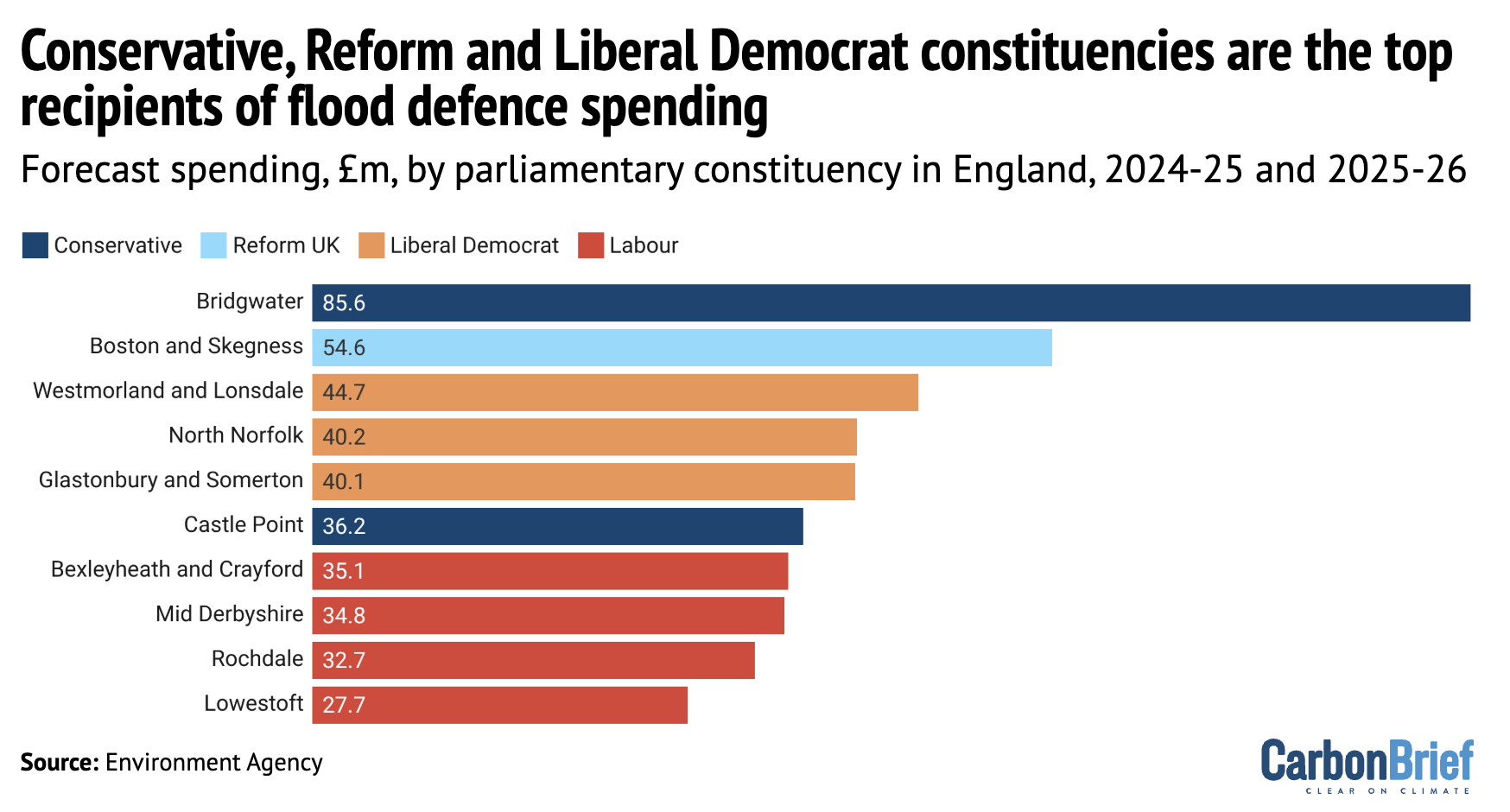
The constituency of Richard Tice MP, the climate-sceptic deputy leader of Reform UK, is the second-largest recipient of flood defence spending in England, according to new Carbon Brief analysis. Overall, the funding is disproportionately targeted at coastal and urban areas, many of which have Conservative or Liberal Democrat MPs.
Spotlight
Is there really a UK ‘greenlash’?
This week, after a historic Green Party byelection win, Carbon Brief looks at whether there really is a “greenlash” against climate policy in the UK.
Over the past year, the UK’s political consensus on climate change has been shattered.
Yet despite a sharp turn against climate action among right-wing politicians and right-leaning media outlets, UK public support for climate action remains strong.
Prof Federica Genovese, who studies climate politics at the University of Oxford, told Carbon Brief:
“The current ‘war’ on green policy is mostly driven by media and political elites, not by the public.”
Indeed, there is still a greater than two-to-one majority among the UK public in favour of the country’s legally binding target to reach net-zero emissions by 2050, as shown below.
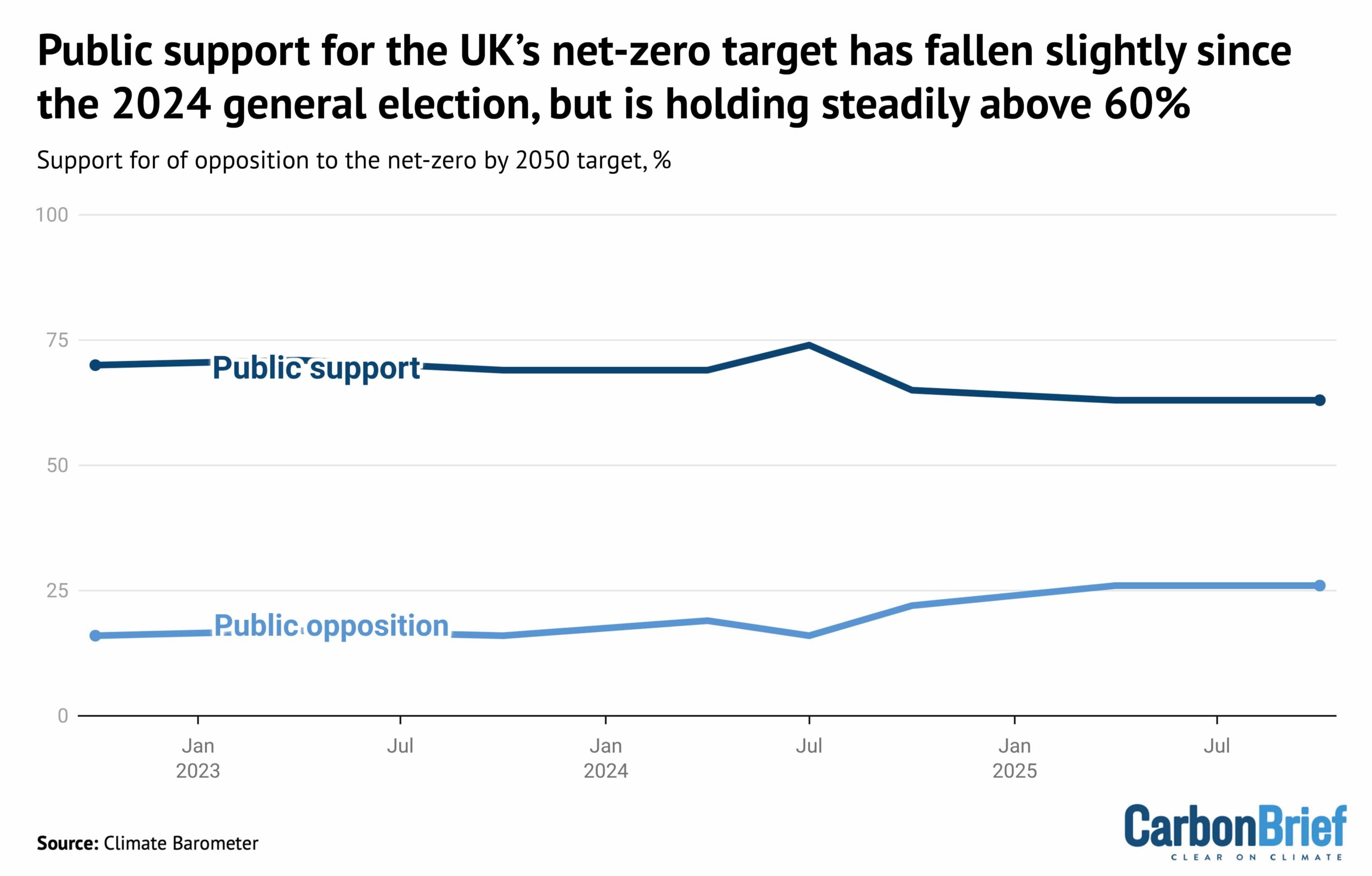
Steve Akehurst, director of public-opinion research initiative Persuasion UK, also noted the growing divide between the public and “elites”. He told Carbon Brief:
“The biggest movement is, without doubt, in media and elite opinion. There is a bit more polarisation and opposition [to climate action] among voters, but it’s typically no more than 20-25% and mostly confined within core Reform voters.”
Conservative gear shift
For decades, the UK had enjoyed strong, cross-party political support for climate action.
Lord Deben, the Conservative peer and former chair of the Climate Change Committee, told Carbon Brief that the UK’s landmark 2008 Climate Change Act had been born of this cross-party consensus, saying “all parties supported it”.
Since their landslide loss at the 2024 election, however, the Conservatives have turned against the UK’s target of net-zero emissions by 2050, which they legislated for in 2019.
Curiously, while opposition to net-zero has surged among Conservative MPs, there is majority support for the target among those that plan to vote for the party, as shown below.
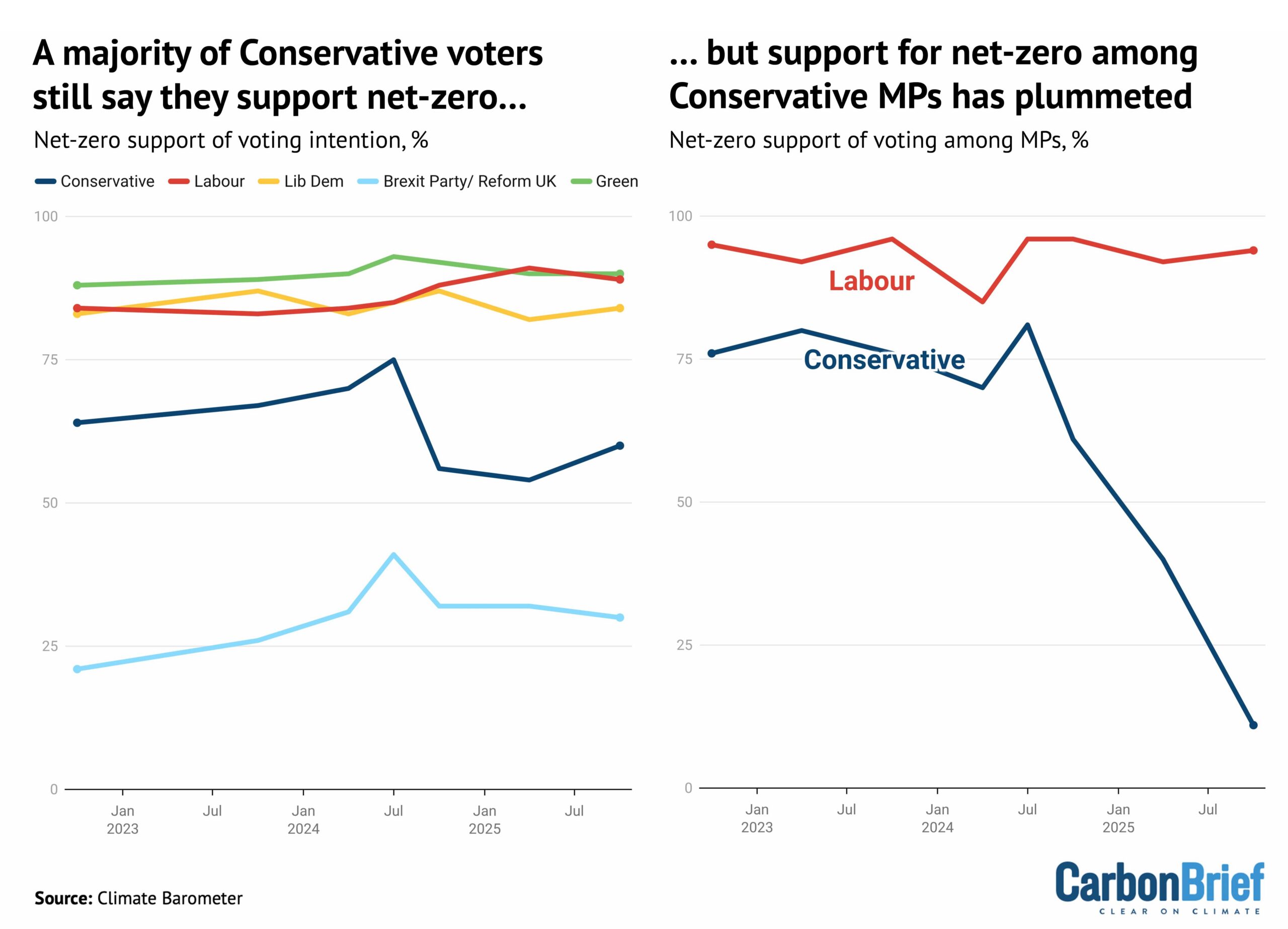
Dr Adam Corner, advisor to the Climate Barometer initiative that tracks public opinion on climate change, told Carbon Brief that those who currently plan to vote Reform are the only segment who “tend to be more opposed to net-zero goals”. He said:
“Despite the rise in hostile media coverage and the collapse of the political consensus, we find that public support for the net-zero by 2050 target is plateauing – not plummeting.”
Reform, which rejects the scientific evidence on global warming and campaigns against net-zero, has been leading the polls for a year. (However, it was comfortably beaten by the Greens in yesterday’s Gorton and Denton byelection.)
Corner acknowledged that “some of the anti-net zero noise…[is] showing up in our data”, adding:
“We see rising concerns about the near-term costs of policies and an uptick in people [falsely] attributing high energy bills to climate initiatives.”
But Akehurst said that, rather than a big fall in public support, there had been a drop in the “salience” of climate action:
“So many other issues [are] competing for their attention.”
UK newspapers published more editorials opposing climate action than supporting it for the first time on record in 2025, according to Carbon Brief analysis.
Global ‘greenlash’?
All of this sits against a challenging global backdrop, in which US president Donald Trump has been repeating climate-sceptic talking points and rolling back related policy.
At the same time, prominent figures have been calling for a change in climate strategy, sold variously as a “reset”, a “pivot”, as “realism”, or as “pragmatism”.
Genovese said that “far-right leaders have succeeded in the past 10 years in capturing net-zero as a poster child of things they are ‘fighting against’”.
She added that “much of this is fodder for conservative media and this whole ecosystem is essentially driving what we call the ‘greenlash’”.
Corner said the “disconnect” between elite views and the wider public “can create problems” – for example, “MPs consistently underestimate support for renewables”. He added:
“There is clearly a risk that the public starts to disengage too, if not enough positive voices are countering the negative ones.”
Watch, read, listen
TRUMP’S ‘PETROSTATE’: The US is becoming a “petrostate” that will be “sicker and poorer”, wrote Financial Times associate editor Rana Forohaar.
RHETORIC VS REALITY: Despite a “political mood [that] has darkened”, there is “more green stuff being installed than ever”, said New York Times columnist David Wallace-Wells.
CHINA’S ‘REVOLUTION’: The BBC’s Climate Question podcast reported from China on the “green energy revolution” taking place in the country.
Coming up
- 2-6 March: UN Food and Agriculture Organization regional conference for Latin America and Caribbean, Brasília
- 3 March: UK spring statement
- 4-11 March: China’s “two sessions”
- 5 March: Nepal elections
Pick of the jobs
- The Guardian, senior reporter, climate justice | Salary: $123,000-$135,000. Location: New York or Washington DC
- China-Global South Project, non-resident fellow, climate change | Salary: Up to $1,000 a month. Location: Remote
- University of East Anglia, PhD in mobilising community-based climate action through co-designed sports and wellbeing interventions | Salary: Stipend (unknown amount). Location: Norwich, UK
- TABLE and the University of São Paulo, Brazil, postdoctoral researcher in food system narratives | Salary: Unknown. Location: Pirassununga, Brazil
DeBriefed is edited by Daisy Dunne. Please send any tips or feedback to debriefed@carbonbrief.org.
This is an online version of Carbon Brief’s weekly DeBriefed email newsletter. Subscribe for free here.
The post DeBriefed 27 February 2026: Trump’s fossil-fuel talk | Modi-Lula rare-earth pact | Is there a UK ‘greenlash’? appeared first on Carbon Brief.
Greenhouse Gases
Analysis: Constituency of Reform’s climate-sceptic Richard Tice gets £55m flood funding
The Lincolnshire constituency held by Richard Tice, the climate-sceptic deputy leader of the hard-right Reform party, has been pledged at least £55m in government funding for flood defences since 2024.
This investment in Boston and Skegness is the second-largest sum for a single constituency from a £1.4bn flood-defence fund for England, Carbon Brief analysis shows.
Flooding is becoming more likely and more extreme in the UK due to climate change.
Yet, for years, governments have failed to spend enough on flood defences to protect people, properties and infrastructure.
The £1.4bn fund is part of the current Labour government’s wider pledge to invest a “record” £7.9bn over a decade on protecting hundreds of thousands of homes and businesses from flooding.
As MP for one of England’s most flood-prone regions, Tice has called for more investment in flood defences, stating that “we cannot afford to ‘surrender the fens’ to the sea”.
He is also one of Reform’s most vocal opponents of climate action and what he calls “net stupid zero”. He denies the scientific consensus on climate change and has claimed, falsely and without evidence, that scientists are “lying”.
Flood defences
Last year, the government said it would invest £2.65bn on flood and coastal erosion risk management (FCERM) schemes in England between April 2024 and March 2026.
This money was intended to protect 66,500 properties from flooding. It is part of a decade-long Labour government plan to spend more than £7.9bn on flood defences.
There has been a consistent shortfall in maintaining England’s flood defences, with the Environment Agency expecting to protect fewer properties by 2027 than it had initially planned.
The Climate Change Committee (CCC) has attributed this to rising costs, backlogs from previous governments and a lack of capacity. It also points to the strain from “more frequent and severe” weather events, such as storms in recent years that have been amplified by climate change.
However, the CCC also said last year that, if the 2024-26 spending programme is delivered, it would be “slightly closer to the track” of the Environment Agency targets out to 2027.
The government has released constituency-level data on which schemes in England it plans to fund, covering £1.4bn of the 2024-26 investment. The other half of the FCERM spending covers additional measures, from repairing existing defences to advising local authorities.
The map below shows the distribution of spending on FCERM schemes in England over the past two years, highlighting the constituency of Richard Tice.
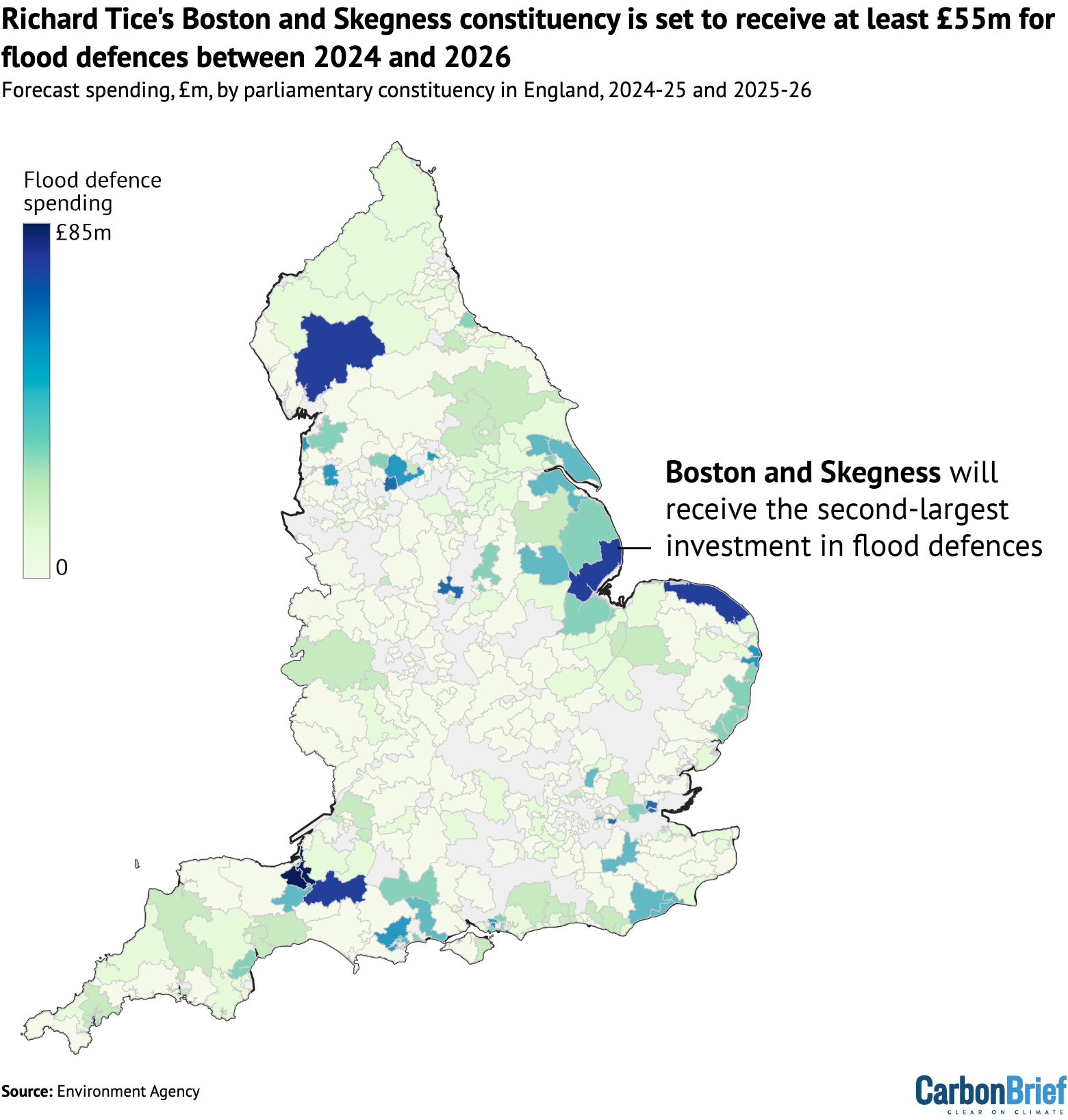
By far the largest sum of money – £85.6m in total – has been committed to a tidal barrier and various other defences in the Somerset constituency of Bridgwater, the seat of Conservative MP Ashley Fox.
Over the first months of 2026, the south-west region has faced significant flooding and Fox has called for more support from the government, citing “climate patterns shifting and rainfall intensifying”.
He has also backed his party’s position that “the 2050 net-zero target is impossible” and called for more fossil-fuel extraction in the North Sea.
Tice’s east-coast constituency of Boston and Skegness, which is highly vulnerable to flooding from both rivers and the sea, is set to receive £55m. Among the supported projects are beach defences from Saltfleet to Gibraltar Point and upgrades to pumping stations.
Overall, Boston and Skegness has the second-largest portion of flood-defence funding, as the chart below shows. Constituencies with Conservative and Liberal Democrat MPs occupied the other top positions.
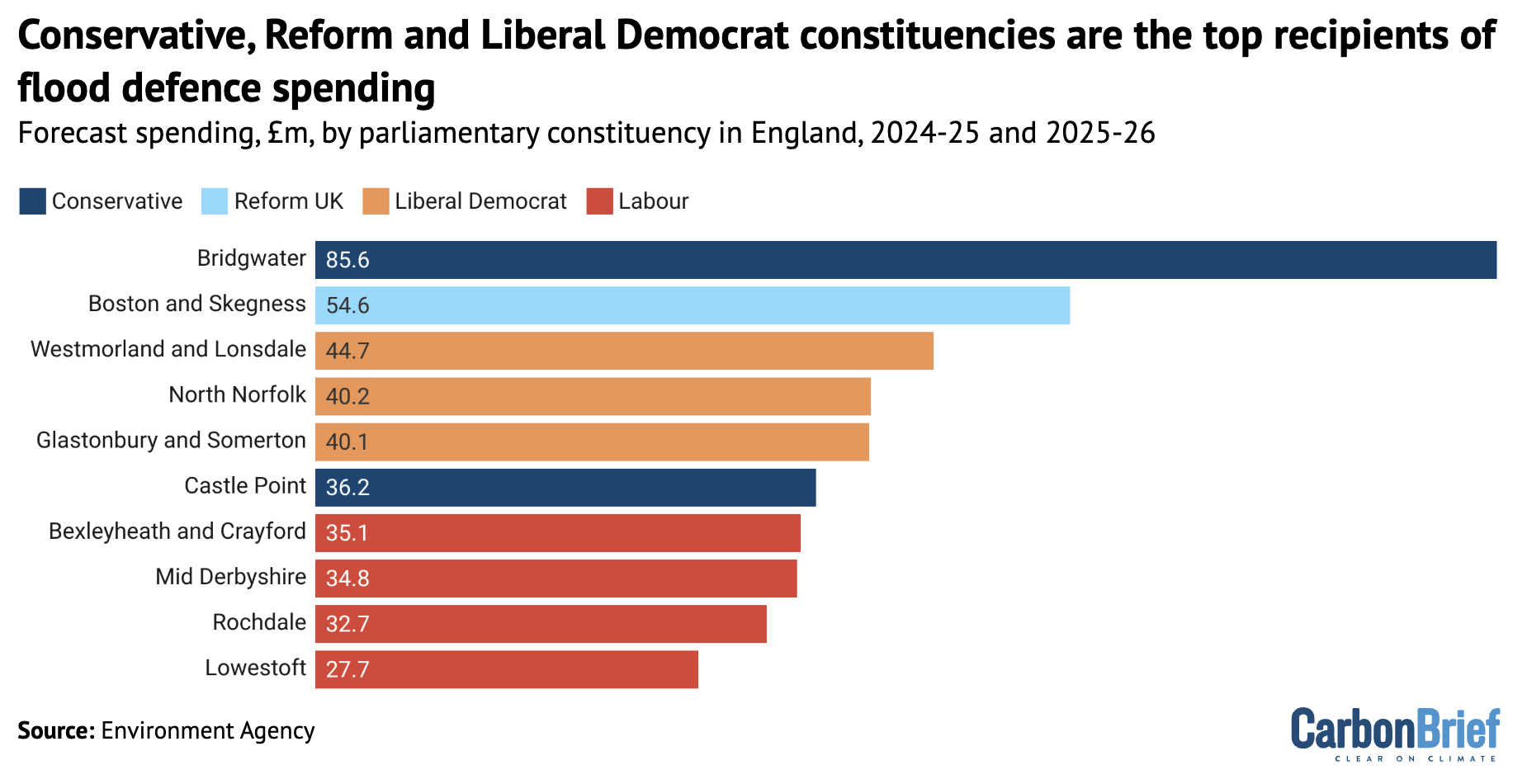
Overall, despite Labour MPs occupying 347 out of England’s 543 constituencies – nearly two-thirds of the total – more than half of the flood-defence funding was distributed to constituencies with non-Labour MPs. This reflects the flood risk in coastal and rural areas that are not traditional Labour strongholds.
Reform funding
While Reform has just eight MPs, representing 1% of the population, its constituencies have been assigned 4% of the flood-defence funding for England.
Nearly all of this money was for Tice’s constituency, although party leader Nigel Farage’s coastal Clacton seat in Kent received £2m.
Reform UK is committed to “scrapping net-zero” and its leadership has expressed firmly climate-sceptic views.
Much has been made of the disconnect between the party’s climate policies and the threat climate change poses to its voters. Various analyses have shown the flood risk in Reform-dominated areas, particularly Lincolnshire.
Tice has rejected climate science, advocated for fossil-fuel production and criticised Environment Agency flood-defence activities. Yet, he has also called for more investment in flood defences, stating that “we cannot afford to ‘surrender the fens’ to the sea”.
This may reflect Tice’s broader approach to climate change. In a 2024 interview with LBC, he said:
“Where you’ve got concerns about sea level defences and sea level rise, guess what? A bit of steel, a bit of cement, some aggregate…and you build some concrete sea level defences. That’s how you deal with rising sea levels.”
While climate adaptation is viewed as vital in a warming world, there are limits on how much societies can adapt and adaptation costs will continue to increase as emissions rise.
The post Analysis: Constituency of Reform’s climate-sceptic Richard Tice gets £55m flood funding appeared first on Carbon Brief.
Analysis: Constituency of Reform’s climate-sceptic Richard Tice gets £55m flood funding
Greenhouse Gases
Cropped 25 February 2026: Food inflation strikes | El Niño looms | Biodiversity talks stagnate
We handpick and explain the most important stories at the intersection of climate, land, food and nature over the past fortnight.
This is an online version of Carbon Brief’s fortnightly Cropped email newsletter.
Subscribe for free here.
Key developments
Food inflation on the rise
DELUGE STRIKES FOOD: Extreme rainfall and flooding across the Mediterranean and north Africa has “battered the winter growing regions that feed Europe…threatening food price rises”, reported the Financial Times. Western France has “endured more than 36 days of continuous rain”, while farmers’ associations in Spain’s Andalusia estimate that “20% of all production has been lost”, it added. Policy expert David Barmes told the paper that the “latest storms were part of a wider pattern of climate shocks feeding into food price inflation”.
-
Sign up to Carbon Brief’s free “Cropped” email newsletter. A fortnightly digest of food, land and nature news and views. Sent to your inbox every other Wednesday.
NO BEEF: The UK’s beef farmers, meanwhile, “face a double blow” from climate change as “relentless rain forces them to keep cows indoors”, while last summer’s drought hit hay supplies, said another Financial Times article. At the same time, indoor growers in south England described a 60% increase in electricity standing charges as a “ticking timebomb” that could “force them to raise their prices or stop production, which will further fuel food price inflation”, wrote the Guardian.
‘TINDERBOX’ AND TARIFFS: A study, covered by the Guardian, warned that major extreme weather and other “shocks” could “spark social unrest and even food riots in the UK”. Experts cited “chronic” vulnerabilities, including climate change, low incomes, poor farming policy and “fragile” supply chains that have made the UK’s food system a “tinderbox”. A New York Times explainer noted that while trade could once guard against food supply shocks, barriers such as tariffs and export controls – which are being “increasingly” used by politicians – “can shut off that safety valve”.
El Niño looms
NEW ENSO INDEX: Researchers have developed a new index for calculating El Niño, the large-scale climate pattern that influences global weather and causes “billions in damages by bringing floods to some regions and drought to others”, reported CNN. It added that climate change is making it more difficult for scientists to observe El Niño patterns by warming up the entire ocean. The outlet said that with the new metric, “scientists can now see it earlier and our long-range weather forecasts will be improved for it.”
WARMING WARNING: Meanwhile, the US Climate Prediction Center announced that there is a 60% chance of the current La Niña conditions shifting towards a neutral state over the next few months, with an El Niño likely to follow in late spring, according to Reuters. The Vibes, a Malaysian news outlet, quoted a climate scientist saying: “If the El Niño does materialise, it could possibly push 2026 or 2027 as the warmest year on record, replacing 2024.”
CROP IMPACTS: Reuters noted that neutral conditions lead to “more stable weather and potentially better crop yields”. However, the newswire added, an El Niño state would mean “worsening drought conditions and issues for the next growing season” to Australia. El Niño also “typically brings a poor south-west monsoon to India, including droughts”, reported the Hindu’s Business Line. A 2024 guest post for Carbon Brief explained that El Niño is linked to crop failure in south-eastern Africa and south-east Asia.
News and views
- DAM-AG-ES: Several South Korean farmers filed a lawsuit against the country’s state-owned utility company, “seek[ing] financial compensation for climate-related agricultural damages”, reported United Press International. Meanwhile, a national climate change assessment for the Philippines found that the country “lost up to $219bn in agricultural damages from typhoons, floods and droughts” over 2000-10, according to Eco-Business.
- SCORCHED GRASS: South Africa’s Western Cape province is experiencing “one of the worst droughts in living memory”, which is “scorching grass and killing livestock”, said Reuters. The newswire wrote: “In 2015, a drought almost dried up the taps in the city; farmers say this one has been even more brutal than a decade ago.”
- NOUVELLE VEG: New guidelines published under France’s national food, nutrition and climate strategy “urged” citizens to “limit” their meat consumption, reported Euronews. The delayed strategy comes a month after the US government “upended decades of recommendations by touting consumption of red meat and full-fat dairy”, it noted.
- COURTING DISASTER: India’s top green court accepted the findings of a committee that “found no flaws” in greenlighting the Great Nicobar project that “will lead to the felling of a million trees” and translocating corals, reported Mongabay. The court found “no good ground to interfere”, despite “threats to a globally unique biodiversity hotspot” and Indigenous tribes at risk of displacement by the project, wrote Frontline.
- FISH FALLING: A new study found that fish biomass is “falling by 7.2% from as little as 0.1C of warming per decade”, noted the Guardian. While experts also pointed to the role of overfishing in marine life loss, marine ecologist and study lead author Dr Shahar Chaikin told the outlet: “Our research proves exactly what that biological cost [of warming] looks like underwater.”
- TOO HOT FOR COFFEE: According to new analysis by Climate Central, countries where coffee beans are grown “are becoming too hot to cultivate them”, reported the Guardian. The world’s top five coffee-growing countries faced “57 additional days of coffee-harming heat” annually because of climate change, it added.
Spotlight
Nature talks inch forward
This week, Carbon Brief covers the latest round of negotiations under the UN Convention on Biological Diversity (CBD), which occurred in Rome over 16-19 February.
The penultimate set of biodiversity negotiations before October’s Conference of the Parties ended in Rome last week, leaving plenty of unfinished business.
The CBD’s subsidiary body on implementation (SBI) met in the Italian capital for four days to discuss a range of issues, including biodiversity finance and reviewing progress towards the nature targets agreed under the Kunming-Montreal Global Biodiversity Framework (GBF).
However, many of the major sticking points – particularly around finance – will have to wait until later this summer, leaving some observers worried about the capacity for delegates to get through a packed agenda at COP17.
The SBI, along with the subsidiary body on scientific, technical and technological advice (SBSTTA) will both meet in Nairobi, Kenya, later this summer for a final round of talks before COP17 kicks off in Yerevan, Armenia, on 19 October.
Money talks
Finance for nature has long been a sticking point at negotiations under the CBD.
Discussions on a new fund for biodiversity derailed biodiversity talks in Cali, Colombia, in autumn 2024, requiring resumed talks a few months later.
Despite this, finance was barely on the agenda at the SBI meetings in Rome. Delegates discussed three studies on the relationship between debt sustainability and implementation of nature plans, but the more substantive talks are set to take place at the next SBI meeting in Nairobi.
Several parties “highlighted concerns with the imbalance of work” on finance between these SBI talks and the next ones, reported Earth Negotiations Bulletin (ENB).
Lim Li Ching, senior researcher at Third World Network, noted that tensions around finance permeated every aspect of the talks. She told Carbon Brief:
“If you’re talking about the gender plan of action – if there’s little or no financial resources provided to actually put it into practice and implement it, then it’s [just] paper, right? Same with the reporting requirements and obligations.”
Monitoring and reporting
Closely linked to the issue of finance is the obligations of parties to report on their progress towards the goals and targets of the GBF.
Parties do so through the submission of national reports.
Several parties at the talks pointed to a lack of timely funding for driving delays in their reporting, according to ENB.
A note released by the CBD Secretariat in December said that no parties had submitted their national reports yet; by the time of the SBI meetings, only the EU had. It further noted that just 58 parties had submitted their national biodiversity plans, which were initially meant to be published by COP16, in October 2024.
Linda Krueger, director of biodiversity and infrastructure policy at the environmental not-for-profit Nature Conservancy, told Carbon Brief that despite the sparse submissions, parties are “very focused on the national report preparation”. She added:
“Everybody wants to be able to show that we’re on the path and that there still is a pathway to getting to 2030 that’s positive and largely in the right direction.”
Watch, read, listen
NET LOSS: Nigeria’s marine life is being “threatened” by “ghost gear” – nets and other fishing equipment discarded in the ocean – said Dialogue Earth.
COMEBACK CAUSALITY: A Vox long-read looked at whether Costa Rica’s “payments for ecosystem services” programme helped the country turn a corner on deforestation.
HOMEGROWN GOALS: A Straits Times podcast discussed whether import-dependent Singapore can afford to shelve its goal to produce 30% of its food locally by 2030.
‘RUSTING’ RIVERS: The Financial Times took a closer look at a “strange new force blighting the [Arctic] landscape”: rivers turning rust-orange due to global warming.
New science
- Lakes in the Congo Basin’s peatlands are releasing carbon that is thousands of years old | Nature Geoscience
- Natural non-forest ecosystems – such as grasslands and marshlands – were converted for agriculture at four times the rate of land with tree cover between 2005 and 2020 | Proceedings of the National Academy of Sciences
- Around one-quarter of global tree-cover loss over 2001-22 was driven by cropland expansion, pastures and forest plantations for commodity production | Nature Food
In the diary
- 2-6 March: UN Food and Agriculture Organization regional conference for Latin America and Caribbean | Brasília
- 5 March: Nepal general elections
- 9-20 March: First part of the thirty-first session of the International Seabed Authority (ISA) | Kingston, Jamaica
Cropped is researched and written by Dr Giuliana Viglione, Aruna Chandrasekhar, Daisy Dunne, Orla Dwyer and Yanine Quiroz.
Please send tips and feedback to cropped@carbonbrief.org
The post Cropped 25 February 2026: Food inflation strikes | El Niño looms | Biodiversity talks stagnate appeared first on Carbon Brief.
Cropped 25 February 2026: Food inflation strikes | El Niño looms | Biodiversity talks stagnate
-
Greenhouse Gases7 months ago
Guest post: Why China is still building new coal – and when it might stop
-
Climate Change7 months ago
Guest post: Why China is still building new coal – and when it might stop
-

 Greenhouse Gases2 years ago
Greenhouse Gases2 years ago嘉宾来稿:满足中国增长的用电需求 光伏加储能“比新建煤电更实惠”
-
Climate Change2 years ago
Bill Discounting Climate Change in Florida’s Energy Policy Awaits DeSantis’ Approval
-
Climate Change2 years ago
Spanish-language misinformation on renewable energy spreads online, report shows
-

 Climate Change2 years ago
Climate Change2 years ago嘉宾来稿:满足中国增长的用电需求 光伏加储能“比新建煤电更实惠”
-
Climate Change Videos2 years ago
The toxic gas flares fuelling Nigeria’s climate change – BBC News
-

 Carbon Footprint2 years ago
Carbon Footprint2 years agoUS SEC’s Climate Disclosure Rules Spur Renewed Interest in Carbon Credits




